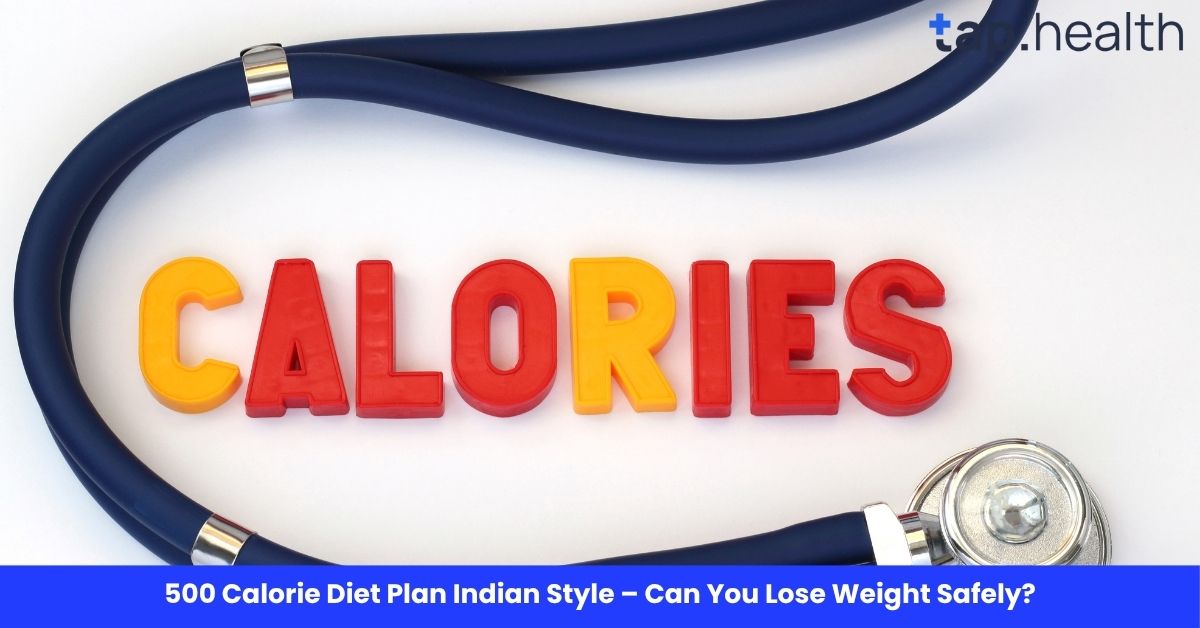The 500-calorie diet is one of the most extreme and low-calorie diet plans available. If you’re looking for rapid weight loss, you may have come across the 500-calorie diet and wondered if it’s possible to lose weight safely on such a restrictive plan. In this article, we will explore the Indian-style 500-calorie diet, its effectiveness, risks, benefits, and more to help you understand whether this diet plan is right for you.
What is a 500-Calorie Diet Plan?
A 500-calorie diet plan means consuming only 500 calories per day, a substantial reduction from the average daily calorie intake needed to maintain weight. For most people, this is far below the recommended daily intake (which is typically around 1,800-2,500 calories depending on age, gender, and activity level).
The idea behind this drastic reduction in calories is to create a large calorie deficit, prompting the body to burn stored fat for energy, leading to quick weight loss.
How Does the 500-Calorie Diet Work?
The 500-calorie diet works by putting the body in a state of caloric deprivation. When you consume fewer calories than your body needs, it turns to stored fat for energy. This is how you lose weight.
However, consuming such a low amount of calories can lead to some significant risks if followed for an extended period, including nutritional deficiencies and muscle loss. Typically, the 500-calorie diet is considered a short-term solution and should only be followed under medical supervision.
Can You Lose Weight Safely on a 500-Calorie Diet?
While the 500-calorie diet can lead to rapid weight loss, it’s not considered safe for everyone. Here are some points to consider when determining whether this diet is safe for you:
- Short-Term Use: The 500-calorie diet should not be followed for an extended period. It is best used as a short-term solution for weight loss, lasting a week or two at most.
- Medical Supervision: Given the extreme nature of the diet, it’s essential to consult a doctor or nutritionist before starting it to ensure it won’t cause harm to your health.
- Nutritional Deficiencies: Consuming just 500 calories a day makes it very difficult to meet your body’s nutritional needs. You may lack essential vitamins and minerals, which can lead to fatigue, hair loss, weakened immunity, and other health issues.
- Muscle Loss: Extreme calorie restriction can result in muscle loss. Since muscle burns more calories than fat, losing muscle mass can slow down your metabolism and hinder long-term weight loss efforts.
Is a 500-Calorie Diet Safe for Women and Men?
While both men and women can technically lose weight on a 500-calorie diet, the calorie needs for women are generally lower than for men. This is why women may find it even more challenging to get all the nutrients they need on such a restrictive diet. For men, a 500-calorie diet could lead to quicker weight loss, but the same risks apply, especially regarding muscle loss and nutrient deficiency.
For both men and women, it’s important to stay hydrated, ensure adequate intake of micronutrients, and get proper medical advice before beginning the diet.
Benefits of a 500-Calorie Diet Plan
- Rapid Weight Loss: One of the biggest reasons people opt for a 500-calorie diet is its ability to produce rapid weight loss results. This can be motivating for people looking to lose weight quickly.
- Breaking Poor Eating Habits: Following a 500-calorie diet forces you to eliminate many unhealthy foods from your diet. This can help reset your eating habits and reduce overeating or cravings.
- Improved Blood Sugar and Cholesterol: In some cases, extremely low-calorie diets have been shown to improve blood sugar levels and reduce cholesterol, which may be beneficial for people with type 2 diabetes or high cholesterol.
- Increased Focus on Healthy Foods: Since the diet restricts food intake so severely, many people choose nutrient-dense, healthy foods that are rich in vitamins and minerals, such as leafy greens, fruits, and lean proteins.
Risks and Drawbacks of the 500-Calorie Diet Plan
1. Nutrient Deficiencies
A 500-calorie diet provides limited food, which makes it hard to get all the necessary vitamins and minerals your body needs to function properly. Common deficiencies include vitamin B12, calcium, iron, and vitamin D. These deficiencies can lead to fatigue, weakness, hair loss, and bone problems.
2. Muscle Loss
When the body is deprived of calories, it begins to break down muscle tissue for energy. Muscle loss can lead to a decrease in metabolism, which can make it harder to lose weight in the future. This is one of the most significant risks of a very low-calorie diet.
3. Slow Metabolism
Extreme calorie restriction can cause your metabolism to slow down as the body adjusts to the lack of food. While you may lose weight initially, your body may eventually adapt to the lower calorie intake, making it harder to continue losing weight.
4. Low Energy Levels
With only 500 calories to fuel the body, you’ll likely feel fatigued, sluggish, and low in energy. This can interfere with daily activities and make it hard to exercise, which is essential for maintaining muscle mass and improving overall health.
5. Increased Risk of Eating Disorders
Extreme diets like the 500-calorie plan can lead to unhealthy eating habits, including binge eating, obsession with food, or disordered eating behaviors.
Sample Indian-Style 500-Calorie Diet Plan
Here’s an example of an Indian-style 500-calorie diet plan. This plan includes whole, nutrient-dense foods that provide maximum nutrition within the limited calorie count.
Breakfast (150 Calories)
- 1 boiled egg (70 calories)
- 1 small apple (80 calories)
Lunch (200 Calories)
- 1 small bowl of moong dal (100 calories)
- 1 small cucumber salad with lemon juice and black salt (50 calories)
- 1 small whole wheat roti (50 calories)
Dinner (150 Calories)
- 1 small bowl of vegetable soup (100 calories)
- 1 cup of low-fat yogurt (50 calories)
Total Calories: 500 calories
This sample plan incorporates traditional Indian foods like dal, roti, and yogurt, providing protein and fiber while keeping the calorie intake low. Make sure to drink plenty of water throughout the day to stay hydrated.
Real-Life Scenario
Riya, a 32-year-old office worker, wanted to lose weight quickly before her wedding. She tried a 500-calorie Indian diet for two weeks. Although she lost 3.5 kg, she also experienced dizziness, weakness, and irritability. Her doctor later advised her to switch to a 1,200-calorie plan with balanced nutrients.
This shows that while such a restrictive diet may help with rapid weight loss, it can be unsustainable and risky without professional guidance.
Expert Contribution
According to dietitians and healthcare experts, a 500-calorie diet should only be followed under strict medical supervision. It’s classified as a very low-calorie diet (VLCD) and is generally prescribed for obese patients who need immediate weight reduction before surgery or for health reasons.
Experts also stress that Indian diets should include lentils, lean proteins, and fresh vegetables to maintain energy levels and support metabolism. Long-term weight management requires lifestyle changes, not crash diets.
Recommendations Grounded in Proven Research and Facts
- Consult a doctor first: A 500-calorie plan can be dangerous without medical monitoring.
- Avoid for long-term use: Following it beyond a few weeks can cause nutrient deficiencies and slow metabolism.
- Stay hydrated: Water, coconut water, and clear soups help maintain electrolyte balance.
- Include protein: Add dal, paneer, or eggs to preserve muscle mass.
- Gradually increase calories: Once weight loss starts, move to a 1,000–1,200 calorie balanced plan.
Research shows that sustainable weight loss comes from consistent calorie control, regular exercise, and balanced nutrition, not extreme restriction.
Frequently Asked Questions (FAQs) on 500 Calorie Diet Plan Indian Style – Can You Lose Weight Safely?
1. Can I Lose 10 kg in a Month on a 500-Calorie Diet?
Yes, it’s possible to lose a significant amount of weight on a 500-calorie diet. However, rapid weight loss may not be sustainable or healthy. It can lead to muscle loss, nutritional deficiencies, and other health issues. It’s important to approach such a drastic diet with caution and medical guidance.
2. How Much Weight Can You Lose on a 500-Calorie Diet in a Week?
On a 500-calorie diet, you may lose 1-2 kg per week due to the large calorie deficit. However, this weight loss may be a combination of fat and muscle, which is not ideal for long-term health.
3. Is It Safe to Follow a 500-Calorie Diet for a Long Time?
No, a 500-calorie diet is not safe for long-term use. It can lead to severe nutritional deficiencies, muscle loss, and a slowed metabolism. It should only be followed for a very short time (1-2 weeks) and under medical supervision.
4. Can I Lose Weight Without Exercise on a 500-Calorie Diet?
Yes, you can lose weight without exercise on a 500-calorie diet due to the significant calorie deficit. However, exercise is important to maintain muscle mass, keep your metabolism healthy, and ensure that you are losing fat, not just water weight and muscle.
5. Can a 500-Calorie Indian Diet Be Customized?
Yes, a 500-calorie diet can be customized to suit Indian preferences. You can incorporate traditional foods like dal, roti, yogurt, and vegetables while maintaining the total calorie count. However, nutritional balance is key, and you should ensure that your diet is not just low in calories but also rich in essential nutrients.
6. How Can I Maintain Weight After a 500-Calorie Diet?
After completing a 500-calorie diet, it’s important to gradually increase your calorie intake to avoid regaining the lost weight. A healthy maintenance diet should focus on whole foods, balanced meals, and regular physical activity.
Conclusion
The 500-calorie diet plan can lead to rapid weight loss, but it comes with significant risks, including nutritional deficiencies, muscle loss, and a slowed metabolism. While it may be effective for short-term weight loss, it’s not a sustainable or healthy approach in the long run. If you are considering trying the 500-calorie diet, it’s crucial to consult with a healthcare professional, follow it for only a short period, and ensure that your body receives essential nutrients.
For a more sustainable approach to weight loss, consider focusing on a balanced, nutrient-dense diet with moderate calorie reduction, combined with regular exercise. Weight loss should be gradual and focused on long-term health and well-being.



